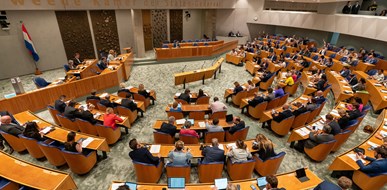Dutch government receives parliamentary questions on European arms exports
Published 21 August 2023
House of Representatives during a debate in June 2023 in The Hague by Jeroen Meuwsen Fotografie @ Shutterstock
A recently published op-ed written by Asser Institute researcher León Castellanos-Jankiewicz has prompted parliamentary questions (kamervragen) addressed to the Dutch government about its arms export policies.
Parliamentary questions are part of a procedure embedded in the Dutch government structure where Representatives or members of the Senate can ask the responsible minister questions related to their portfolio. It is one of the most commonly used methods to check on the government.
The questions were submitted by representative Jasper van Dijk (Socialist Party) and asked whether the government is doing enough to ensure access to justice for gun victims harmed by European weapons. The op-ed, published in Dutch national daily NRC, highlights that European arms manufacturers are virtually untouchable in court.
Mr van Dijk observed that: “According to the UN, Europe is an important starting point for illegal arms flows. That has to change.” The Dutch government has four weeks to respond to the questions submitted on 10 August and addressed to the Minister for Foreign Trade and Development Cooperation.
Accountability lacking
The op-ed by Castellanos-Jankiewicz argues that the mechanisms in place to challenge arms export licenses in Europe are lacking. As a result, victims of gun violence face a number of obstacles when attempting to use the courts to hold negligent corporations in the arms industry accountable. Obstacles they face include deficient regulatory frameworks, namely, licensing and export agreements; lack of access to information about arms exports and sales; and limited judicial oversight on weapons exports.
International human rights due diligence
In many parts of Latin America, up to 40% of weapons found at crime scenes are made by European companies. Castellanos-Jankiewicz: “Arms trade that takes place in violation of human rights and (inter)national law is harmful to peace and security, and leads to deaths and injuries around the world.” He concludes that a better system is feasible by highlighting judicial precedents which provide models for accountability: “In 2021, a Stuttgart court fined German arms manufacturer Heckler & Koch €3.7 million for illegal arms sales. The weapons had been used in the kidnapping and murder of 43 missing Mexican
The op-ed also discusses a recently published report completed by the University of Amsterdam Law Clinics in cooperation with the Asser Institute. The report discusses the avenues for redress available to victims of gun violence caused by negligent European arms sales from the standpoint of human rights law in eleven European countries. It includes analysis on the Netherlands, Belgium, France, Germany, Spain, Italy, Romania, Sweden and the United Kingdom.
More information:
About León Castellanos-Jankiewicz
Dr León Castellanos-Jankiewicz is researcher in international law at the Asser Institute and academic coordinator of the Netherlands Network for Human Rights Research. His work focuses on international human rights law, the history of international law and minority protection. Léon is part of the research strand In the public interest: accountability of the state and the prosecution of crimes, which examines the accountability of states in light of public interest standards in the context of counter-terrorism; and the prosecution of individuals for international and transnational crimes in the public interest. This strand alse investigates the role of journalists, the (new) media, human rights NGOs and academics in protecting and promoting public interest standards.
Read more
León has published a number of op-eds addressing how difficult it is to hold European gun manufacturers accountable. His op-ed is in Dutch for the NRC (Europese wapenfabrikanten zijn juridisch vrijwel onaantastbaar. Dat moet veranderen). He published another op-ed in English (The Armor of the European Arms Industry) and Spanish (El blindaje de las armerias europeas).
El blindaje de las armerías europeas
) in El País.
Together with Melanie Schneider, León explains how including the Arms Sector in the EU Corporate Due Diligence Directive could reinforce monitoring and verification on Verfassungsblog.
